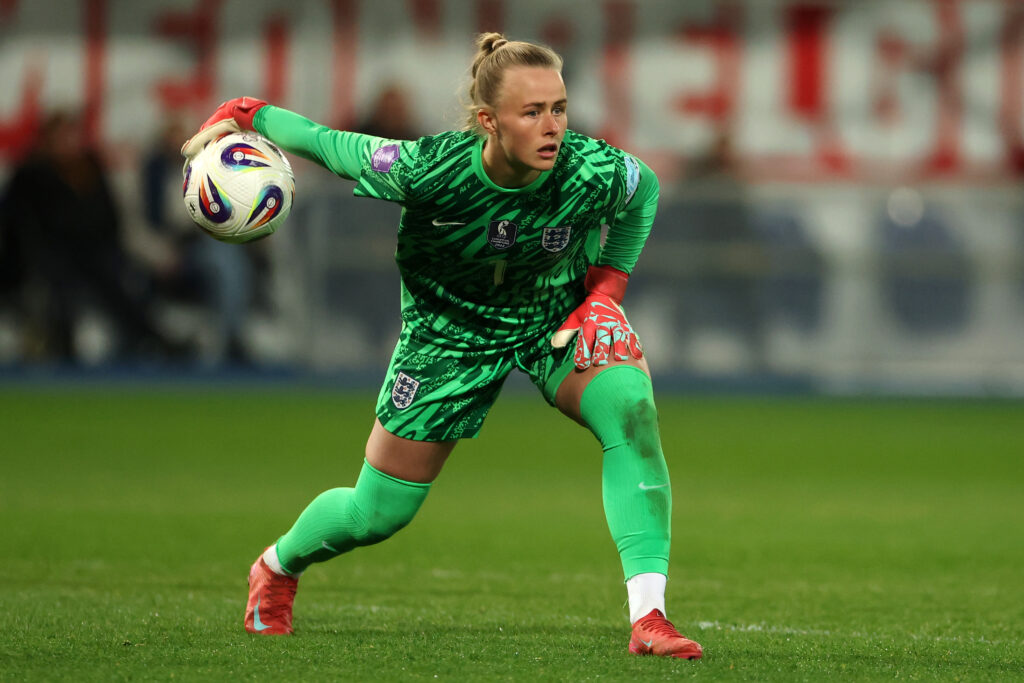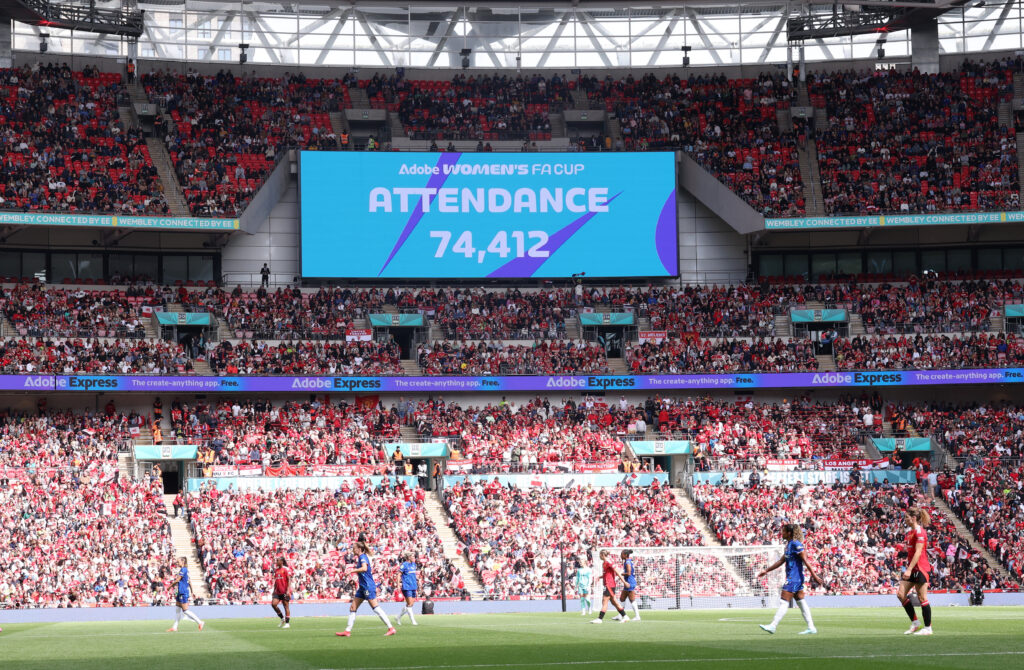UEFA's 2025 Euro tournament is already knocking on the door of history, as the European Championship is on track to shatter the competition's overall attendance record — despite not kicking off until next week.
This year's Switzerland-hosted edition has sold more than 570,000 of the 673,000 tickets available as of Thursday.
Given that tally, England's 2022 Euro record of 574,875 is likely to fall in the coming days.
In addition to the tickets already on sale, stadiums will release another 32,000 to accommodate the knockout stages in the coming weeks.
While Switzerland is poised to claim the Euro's total attendance title by the competition's July 27th finale, England's single-game record crowd of 87,192 — set at the 2022 championship match — will be safe, as no Swiss venue matches the capacity of London's iconic Wembley Stadium.
The 2025 Euro final will be a much more elite affair, as only 34,250 seats are available at Basel's St. Jakob-Park — the largest of the tournament's eight venues.
That said, this summer's European Championship will have more eyes on it than ever before, and not just from the stands.
The 2022 edition shattered viewership records worldwide, but the 2025 Euro has a chance to level up even more, as the tournament has seen its global broadcast footprint expand — particularly in the US.
UEFA inked a media deal with Fox Sports in late May, ensuring that audiences Stateside will have live access to at least 20 of the Euro's 31 matches next month.
While the overall tournament chases new attendance and viewership records, the 16 teams bound for Switzerland will be battling toward the 2025 Euro trophy when the competition kicks off next Wednesday.
A report released by analytics company Nielsen Sports and beverage corporation PepsiCo this week indicates that women's soccer is on track to amass upward of 800 million fans by 2030 — eventually making it the fifth largest sport in the world.
Nielsen estimates that women's soccer currently has the world's 10th biggest fanbase, but the study's prediction of a 38% increase in reach over the next five years would have the sport eventually rivaling top spectator draws like pro tennis and Formula One.
Already a powerhouse in the US, the rise of the European women's game has been particularly significant.
For example, the UK-hosted 2022 Euro saw fan interest in the women's game double in England, with that growth beginning well before the Lionesses' historic title win.
The report also notes that women's soccer still lags behind in terms of corporate sponsorship, highlighting increased opportunities for brands as the fanbase expands.
"We see women's football as more than just a sport," said PepsiCo EVP and chief marketing and growth officer Jane Wakely. "It's a cultural force with the power to connect, inspire and grow our brands."
"From media rights to sponsorship and fan engagement, this is no longer a case of future promise but present value," said Nielsen Sports head of international Samantha Lamberti.
Ultimately, the current trajectory of women's soccer is seeing the sport carve out a more powerful place in the global market — so long as investors also see the vision.
"We have long believed in the potential of women's football," added Lamberti. "Today, we're no longer just tracking progress, we're witnessing a breakthrough."
With the 16-team UEFA Euro 2025 set to kick off in Switzerland in less than five weeks, UEFA is seizing the opportunity to expand its global footprint following a breakout 2022 tournament.
The continental governing body is starting stateside, with Fox Sports announcing Wednesday that its platforms will air 20 matches from the upcoming 31-game European Championship live — marking the women's side's largest US media deal on record.
With no major events scheduled for the USWNT, international women's soccer will take center stage this summer, as the Euro, Copa América, and Africa Cup of Nations all return in July.
Fox Sports will also bring Copa América action to US viewers for the first time ever this summer, with broadcast details still to come.

England raises prize money for Lionesses
England is also upping its investment, with the FA agreeing to pay the Lionesses a record £1.7 million bonus package — nearly $2.3 million — should they successfully defend their 2022 title.
This year's total more than doubles the amount England players received for reaching the 2023 World Cup final.
While exact sums will vary, player payouts would average £73,000 each (over $98,000) — up some £18,000 ($24,000) from the Lionesses' 2022 earnings.
The move follows UEFA's earlier decision to double its own prize pool in 2025, raising the total purse to £34 million (almost $46 million), including an extra £4.3 million ($5.8 million) for the winner.
How to watch the 2025 Euros this summer
The 2025 European Championship kicks off on July 2nd when Iceland faces Finland at 12 PM ET before Switzerland takes on Norway at 3 PM ET, live on Fox.
Longtime England goalkeeper Mary Earps announced her retirement from international play on Tuesday, immediately ending her run just five weeks before the Lionesses begin their 2022 Euro title defense.
"My journey has never been the simplest, so in true Mary fashion, this isn't a simple goodbye — right before a major tournament," Earps said in a retirement post on Instagram. "Nonetheless, I know this is the right decision."
Despite the seemingly snap choice, Earps later clarified that she "spent a long time making this decision and it's not one I've made lightly. For me, ultimately this is the right time for me to step aside and give the younger generation an opportunity to thrive."
Earps led England to their first-ever European Championship plus the 2023 World Cup final in her 53 international caps.
However, Lioness manager Sarina Wiegman told media earlier this year that the 32-year-old Earps would likely take a backseat to Chelsea keeper Hannah Hampton at July's 2025 Euro.
"I had hoped that Mary would play an important role within the squad this summer, so of course I am disappointed," Wiegman said after Earps's retirement news broke.

Hampton to lead new-look England goalkeeping core
Hampton, who shared the 2024/25 WSL Golden Glove with Manchester United's Phallon Tullis-Joyce — a top USWNT keeper prospect — will now take over as England's No. 1 net-minder, though the 24-year-old still lacks experience in a major tournament.
Playing behind Hampton will be 20-year-old Manchester City goalie Khiara Keating and 30-year-old Orlando Pride keeper Anna Moorhouse — who owns the NWSL's single-season shutouts record. Both have been club standouts, though neither has logged a cap for England.
As for Earps, her football journey will continue at the club level with PSG, with the now-former Lioness promising that "There's so much to still look forward to, and I have so much energy to continue to strive for greatness, to continue to learn and push myself to maximise every last ounce of potential I have."
Adding to their already historic season, 2024/25 WSL champions and 2025 League Cup winners Chelsea FC handed Manchester United a 3-0 defeat in Sunday's 2025 FA Cup final, completing the club's second-ever domestic treble.
Though the Blues first claimed an elusive treble in the 2020/21 season, this year's roster did so without dropping a single match in any of the three domestic competitions.
"I could not have expected this," said first-year Chelsea manager Sonia Bompastor about her debut success leading the Blues. "It is almost ideal in terms of domestic dominance."
To clinch that dominance, Chelsea upended the defending FA Cup champs Manchester United at London's iconic Wembley Stadium behind a brace from French fullback Sandy Baltimore and a header from USWNT attacker Catarina Macario.
Baltimore gave Chelsea the lead by slipping a late first-half penalty past 2024/25 WSL Golden Glove winner and USWNT goalkeeper prospect Phallon Tullis-Joyce, and the Blues never relented, with second-half sub Macario doubling their scoreline in the 84th minute before Baltimore tacked on a final goal in stoppage time.
"It's a very emotional day," an emotional Macario told the broadcast after finishing her first season following a long ACL recovery. "It's a trophy we always wanted to win."
"All the credit to my players," said Bompastor. "We showed our mentality and our values in this game so we ended the season in an almost perfect scenario – we won, we were playing at Wembley, the stadium was nearly sold out, and we had a strong performance and result against a strong opponent."
"It is an almost ideal way to finish the season."

FA Cup crowds prove sustained demand for women's soccer
Chelsea FC's undefeated treble-winning season wasn't the only notable victory on Sunday, as the FA Cup final drew a crowd of over 74,000 fans for the third straight year.
Sunday's 74,412 attendance mark was just shy of both last year's crowd of 76,082 and the 77,390 fans who watched Chelsea defeat the Red Devils in 2023 — all well beyond the tournament final's previous record of 49,094 attendees achieved in 2022.
Fueled by the football fervor following England's 2022 Euro victory — the country's first international trophy, men's or women's, since the 1966 men's World Cup — the 2023 FA Cup final still stands as the largest crowd at a domestic women's soccer match across all nations.
With Sunday's match joining the over-74,000 attendance club, it's clear the post-Euros enthusiasm wasn't a blip, but a boost to the continued growth and sustained success of the women's game.
FIFA confirmed that the inaugural Women’s Club World Cup will now kick off in 2028, officially delaying its original 2026 launch this week.
Instead, soccer's world governing body will introduce a new Champions Cup next year, with FIFA ratifying both events on Wednesday.
The alternate Champions Cup will be a smaller, six-club affair with winners from regional tournaments like the UEFA Champions League and Concacaf Champions League.
FIFA plans to make the Champions Cup an annual event set for every year that does not include the quadrennial Club World Cup.
While worldwide club tournaments are an exciting prospect, a crowded schedule, lack of secured funding, and little news of the proposed 19-team Club World Cup’s development prompted timing concerns as 2026 rapidly approaches.
Now kicking off in early 2028, the Club World Cup will initially begin with six top clubs representing the AFC, CAF, Concacaf, CONMEBOL, the OFC, and UEFA. Those teams will take part in the play-in stage, where three winners will advance to the group stage.
Those three clubs must then contend with five directly qualified UEFA teams, plus two direct qualifiers each from CAF, CONMEBOL, AFC, and Concacaf.
While demand for increased global programming is spreading, FIFA’s delay underlines the logistical hurdles of creating new competitions — not to mention the strain they can cause athletes.
"FIFA needs to involve its stakeholders, like the NWSLPA and NWSL, for an event like this to reach its potential," NWSL Players Association executive director Meghann Burke told ESPN on Wednesday.
"Otherwise, they are hamstringing women's football yet again like they've done since time immemorial."
UK takes aim at 2027 FIFA World Cup
In other international soccer news, the UK announced Wednesday that the country is preparing a bid to host the 2035 FIFA World Cup, with England, Scotland, Wales, and Northern Ireland joining forces in an attempt to bring the sport’s biggest event to the United Kingdom.
England’s track record should make the bid particularly attractive after hosting the 2022 Euro to record-shattering attendance and global viewership success — and seeing the home side emerge victorious in the Lionesses first-ever major tournament win.
"Football is and always will be at the core of our country’s identity," said UK Prime Minister Keir Starmer, throwing the government's full support behind the bid.
"That pride was on full display when England hosted the Women’s Euro 2022. It not only showed the best of our nation to the world but inspired a generation of girls into the game, all whilst boosting the economy."
Should FIFA ultimately award the 2035 hosting duties to the UK, that tournament will mark the first World Cup hosted by the nation since the men's 1966 edition.
With Brazil set to host the 32-team 2027 World Cup and the US expected to lead a serious bid for the expanded 48-team 2031 edition, the FIFA Council officially recommended this week that either African or European nations serve as host for 2035.